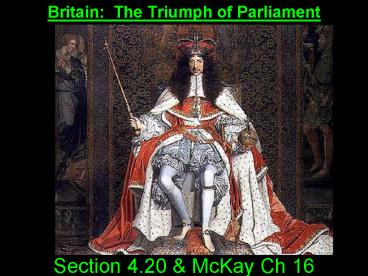Section 4'20 - PowerPoint PPT Presentation
1 / 14
Title:
Section 4'20
Description:
1603 1625 1629 1640 1649 1653 1660 1673 1685 1688. James I ... Had charm, poise, & political skills [unlike his father! ... Had secret Catholic sympathies. ... – PowerPoint PPT presentation
Number of Views:40
Avg rating:3.0/5.0
Title: Section 4'20
1
Section 4.20 McKay Ch 16
- Britain The Triumph of Parliament
2
English Absolutism
Charles I comes to power
James II
Long Parliament begins
Moderate
Radical
Thermidorian
Restoration
Constitution
Interregnum
Restoration
Thorough
1603 1625 1629 1640 1649 1653 1660 1673
1685 1688
Test Act
Glorious Revolution
James I Stuart Reign begins
Charles I dissolves Parliament after it issues
Petition of Right
Charles II
The Protectorate
3
King Charles II r. 1660-1685
- Had charm, poise, political skills unlike his
father!. - Restored the theaters and reopened the pubs and
brothels closed during the Restoration. - Favored religious toleration.
- Had secret Catholic sympathies.
- Realized that he could not repeat the mistakes
his father had made.
4
King Charles II r. 1660-1685
- 1661 ? Cavalier Parliament filled with
Royalists - Disbanded the Puritan army.
- Pardoned most Puritan rebels.
- Restored the authority of the Church of England.
- 1662 ? Clarendon Code Act of Uniformity
- All clergy church officials had to conform to
the Anglican Book of Common Prayer. - It forbade non-conformists (Puritans) to
worship publicly, teach their faith, or attend
English universities
5
King Charles II r. 1660-1685
- 1673 ? Test Act
- Parliament excluded all but Anglicans from
civilian and military positions.to the Anglican
gentry, the Puritans were considered radicals
and the Catholics were seen as traitors! - Movement to exclude James from the throne by law
grows - Exclusionists (known as Whigs) were mostly from
Upper Aristocracy (great nobles) - Kings supporters (Tories) Lower Aristocracy and
gentry - 1679 ? Habeas Corpus Act
- Any unjustly imprisoned persons could obtain a
writ of habeas corpus compelling the govt. to
explain why he had lost his liberty.
6
The Restoration Continued
- Re-Catholicization was a slow drifting tendency
in much of Europe - England remained staunchly anti-Catholic
- Charles II was Catholic at heart
- Secret treaty of Dover of 1670
- Charles agreed to help Louis against the Dutch
- Louis agreed to give Charles 3 million livres
- James the heir of Charles announced his
conversion to Rome (Catholicism) - Declaration of indulgence
- Charles II announced non-enforcement of laws
against dissenters - Viewed as a way to promote Catholics
James II of England
7
King James II r. 1685-1688
- Was a bigoted convert to Catholicism without any
of Charles IIs shrewdness or ability to
compromise. - Alienated even the Tories.
- Provoked the revolution that Charles II had
succeeded in avoiding!
8
King James II r. 1685-1688
- Introduced Catholics into theHigh Command of
both thearmy and navy. - Camped a standing army a fewmiles outside of
London. - Surrounded himself with Catholic advisors
attackedAnglican control of theuniversities. - Claimed the power to suspend or dispense with
Acts of Parliament. - 1687 ? Declaration of Liberty of Conscience
- He extended religious toleration without
Parliaments approval or support.
9
The Revolution of 1688
- 1685 James II becomes king
- Suspends the Test Act and appoints Catholics to
important positions - Moves Tories over to Whig side
- 1688 a son is born to James II and baptized
Catholic - 1685 Edict of Fontainebleau in France
- Appears that England will become Catholic again
10
The Glorious Revolution 1688
- Whig Tory leaders offered the throne jointly to
James IIs daughter Mary raised a Protestant
her husband, William of Orange. - He was a vigorous enemy of Louis XIV.
- He was seen as a champion of the Protestant cause.
11
English Bill of Rights 1689
- It settled all of the major issues between King
Parliament. - It served as a model for the U. S. Bill of
Rights. - It also formed a base for the steady expansion of
civil liberties in the 18c and early 19c in
England.
12
English Bill of Rights 1689
- Main provisions
- The King could not suspend the operation of laws.
- The King could not interfere with the ordinary
course of justice. - No taxes levied or standard army maintained in
peacetime without Parliaments consent. - Freedom of speech in Parliament.
- Sessions of Parliament would be held frequently.
- Subjects had the right of bail, petition, and
freedom from excessive fines and cruel and
unusual punishment. - The monarch must be a Protestant.
- Freedom from arbitrary arrest.
- Censorship of the press was dropped.
- Religious toleration.
13
Coalition Against France
- England joins the coalition against France under
Williams leadership - England lends money to the Dutch
- Create the Bank of England
- Creates liquidity that the Continent cannot match
- British National Debt
- Merchants of London, Whig aristocrats, having
lent money to gov had big reason to defend it
14
Glorious Revolution
- Sum of events after 1688 became known as the
Glorious Revolution - Justified by John Locke
- Right of rebellion against tyranny (not in
Ireland) - Natural Rights
- Parliamentary government
- Rule of law
- Restrictions on the power of English kings
- England is not a democracy
- no salaries for public officials
- Had to be wealthy to serve
- serves the landed aristocracy































